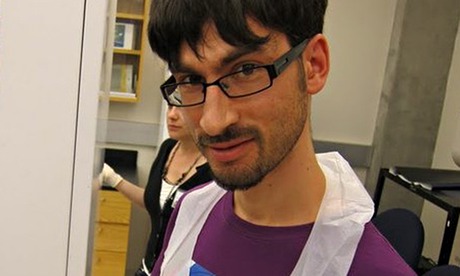This blog is about obtaining online training and online degrees. It covers a range of distance courses, including online graduate programs, online PhD programs, and online certificate courses. It has advice, information and personal comments about studying online, information about learning styles, and even includes details of how you can obtain free online learning.
Monday, February 24, 2014
Learning {RE}imagined – Digital Learning : Tailored or Taylored?
An initiative for 2014 is to get UK children to learn how to write computer code. The reporter talking about the idea shows her ignorance of technology, Jeremy Paxman shows he’s a technology luddite knows nothing about nothing, and the director of the “Year of Code” initiative, Lottie Dexter, says she can’t write any computer code, but you can learn it in a day!
Saturday, February 22, 2014
CrazyTalk7 Pro: Create Stellar Animations On Your Mac
WHY WE LOVE IT
We know making your dog talk with your own voice is entertaining and will get everyone laughing hysterically. With CrazyTalk 7 Pro you can take pets, sketch drawings, baby photos or inanimate objects to create fun and interesting videos in minutes.
You can communicate in a fresh way with visual messages, animated holiday greetings, or lively presentations that grab everyone’s attention. Upload your creation to the CrazyTalk app to share and animate on popular iDevices.
THE PROOF
“Thank goodness CrazyTalk for Mac has been released. Now I don’t have to restart my mac into bootcamp. CrazyTalk has been the best tool for Facial animation on Jimmy Kimmel live for years for the simple reason: the script can always change at the last minute. CrazyTalk keeps up!” – Jesse Griffith, Animator – Jimmy Kimmel Live, ABCTelevision Group
“I LOVE the new CrazyTalk for Mac! It has finally arrived on the right platform for creatives to explore the boundaries of their imagination. CrazyTalk7 is an elegant and sophisticated facial animation app that will quickly become the secret weapon of animators and storytellers. Finally after a LONG wait CrazyTalk is available for the Mac!” – Eric Rosner, Illustrator
THE GOODS
CrazyTalk7 is the most popular facial animation tool that uses sound and text to vividly animate facial images.
With this groundbreaking Auto Motion technology, you just need to import images, specify the facial feature points and record your own voice to automatically generate lip-syncs to create 3D life-like, talking videos.
Tuesday, February 18, 2014
Bloom's Digital - Web 2.0
TOUCH this image to discover its story. Image tagging powered by ThingLink
Social Media 101: Is There a Place For Social Media in Classrooms? [Infographic]
Constructive uses of social media in education is becoming an integral (and one might venture inevitable) part of the learning experience. Here’s a look at how so, at every stage of the game.
Wednesday, February 12, 2014
5 Assessment Strategies Every Teacher Should Know
"Most teachers and current textbooks offer varied approaches to the material to be learned so the teaching can be brain-compatible with the varied student learning styles. It is only logical that respect for these individual learning styles be incorporated into assessment forms."
An interview with Canadian MOOC pioneer George Siemens
George Siemens, Canada’s MOOC pioneer, opens up about where the movement is headed.
Sunday, February 9, 2014
Curious Homework: An Inquiry Project for Students and Parents
edutopia.org – International educator Scot Hoffman is a big believer in the power of curiosity to drive learning. After nearly two decades of teaching around the globe, he also realizes that school isn’t always so hospitable to inquiring minds. (As Einstein said, “It’s a miracle that curiosity survives formal education.”) That’s why Hoffman has developed The Curiosity Project, a self-directed learning experience that engages students, parents, and teachers as collaborators in inquiry.
Friday, February 7, 2014
Postdoc diaries: where are all the entry-level academic jobs?
theguardian.com - Dean D'Souza, PhD in cognitive neuroscience
Securing employment is becoming increasingly difficult. But there are at least two routes to a postdoctoral research career. The first is to develop a research proposal and then seek funding for it. The advantage of this option is that you can seek answers to questions that you thought about during your PhD training but never had the time to pursue. The second route is to apply for an advertised job and work on someone else's project. The advantage of this is that you will learn different perspectives, methodologies and techniques. So I find myself at a junction, with an important choice to make. Do I take the blue pill and extend my research? Or do I take the red pill and find out how deep the rabbit hole goes?

Wednesday, February 5, 2014
The Student-Led Backlash Against New Orleans's Charter Schools
Collegiate Academies is seen by many as the crown jewel of the New Orleans charter school system, which is itself believed to be a national model for urban education. The charter operator’s flagship school, Sci Academy, boasts the best test scores of any open-enrollment high school in the city’s Recovery School District. In 2010, Oprah cut the school a $1 million check.
But this past November, a chain of events started that calls into question whether Collegiate Academies—and other New Orleans charters with similar models—will be able to maintain their success long-term.
First, students at Joseph S. Clark Preparatory High School, another New Orleans school, staged a sit-in after a beloved teacher was abruptly fired.
Days later, almost 100 students at two Collegiate Academies schools walked out. The next day, about 20 of them walked out again and staged a protest in front of their schools. They said they wanted to draw attention to what they believe are unfair discipline policies. The following month, students rallied at a nearby park after school, then walked to a school board meeting where they attempted to present the board with a list of grievances that ranged from academics ("We have no textbooks to review when we study") to discipline ("We get disciplined for anything and everything") to food service ("We want hot meals and healthy food with taste").
What’s going on? Why the backlash against schools that are trying (and in many cases succeeding) to improve education in New Orleans?
Critical Thinking: Educating Competent Citizens
"Critical thought is a cognitive process that proposes the systematic analysis of information, opinion and statements that we accept in our daily life as valid or true. It is a basic skill for a competent, free and responsible citizen."
Monday, February 3, 2014
▶ Skype used iStudio Presentation : Make better Presentation than Real - YouTube
iStudio used for explaining how it works for Class room for live lecture. New iStudio class is designed for a class to have better presention than nomal Proj...
5 Tips to Help Teachers Who Struggle with Technology
Guest blogger Josh Work, middle school teacher and Marine Corps reservist, talks about teachers who struggle with technology and offers five professional development tips that can bring staff up to speed for school-wide technology integration...
Sunday, February 2, 2014
4 Steps To Creating Confident And Creative Thinking Students - Edudemic
Think about it: when children are young, they're encouraged almost constantly to be creative. They tell stories, play make believe and dress up, build forts, and draw pictures.
Academic ideals are being crushed to suit private-sector style management
theguardian.com - 'British higher education sector is in crisis mode and those chosen to oversee this crisis are recruited from the private sector.' Photograph: Alice Bell As an early-career lecturer in a post-1992 university, I often feel like a rare bird in an ornate cage struggling to maintain its dignity in a discount superstore filled with pets. This bird knows it could have been a proud representative of a noble lineage and chirrups dolefully as it ruffles its plumes, but the song is drowned out by the bustling sale of cheap, plastic imitation bird-objects around it.
